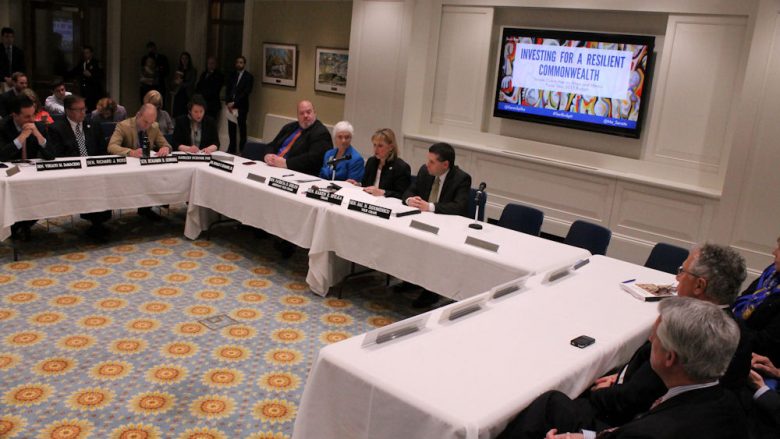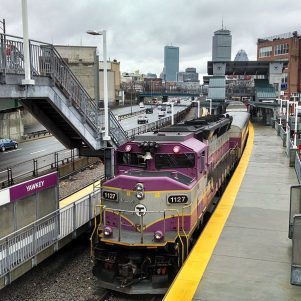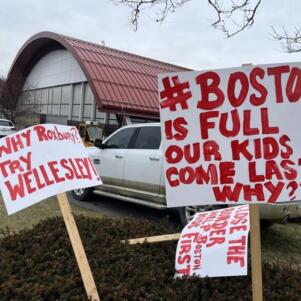Senate panel backs 3.5% spending boost in state budget
By State House News Service | May 17, 2016, 12:43 EDT
 Members of the state Senate Ways and Means committee met Tuesday morning to consider the chamber’s budget proposal. (State House News Service photo by Antonio Caban)
Members of the state Senate Ways and Means committee met Tuesday morning to consider the chamber’s budget proposal. (State House News Service photo by Antonio Caban) BOSTON – A Senate committee on Tuesday unanimously endorsed an annual budget that includes funding for 150 new residential substance abuse treatment beds, hundreds of new rental assistance vouchers and investments in education programs that exceed appropriations approved by the House in April.
The $39.497 billion budget roughly hews to the proposals by Gov. Charlie Baker and the House, which aim to limit spending growth next year to about 3.5 percent. The full Senate is set to take up the budget starting Tuesday, May 24 with a Thursday deadline for filing amendments.
The Senate budget attempts to limit growth in the budget’s biggest expenditure, MassHealth, to $15.4 billion, orders a $211 million deposit into the state’s rainy day fund to raise its balance to $1.47 billion, and uses about $255 million in one-time revenues – a reduction from year’s past.
“I believe that the budget you have before you is a fiscally responsible budget,” Senate Ways and Means Chairwoman Karen Spilka told reporters before the committee voted on the bill. Noting the effort to bulk up state savings, the Ashland Democrat said another recession is inevitable.
Sen. Vinny DeMacedo, the ranking Republican on the Ways and Means Committee, noted the budget’s commitment to building the rainy day fund without drawing on any reserves to fund programs in the budget. “That message that that sends to the bond holders and those people paying attention to how we as a Commonwealth are paying attention to our financial concerns sends a strong message,” deMacedo said before the committee voted on the bill.
The budget itself features cover art from Framingham’s Sorin Bica, an oil on canvas called “Family Ties,” which Spilka said was consistent with the theme of the Senate spending plan and efforts to help children become resilient.
While the budget outpaces the House on spending for higher education and K-12 school aid to local districts, its bottom line is about $11 million below the final version passed by the House.
Spilka said she didn’t know which accounts in the committee’s budget were funded at levels below those recommended by the House. “I don’t know. You’d have to ask the House where their high numbers are,” Spilka said at a briefing. She said, “I can’t say, what, ‘We are so much higher here. We are so much lower there.’ Yeah, it all evens out I guess.”
Spilka said the main difference between the House budget and the Senate Ways and Means budget is the emphasis the Senate placed on education, spending about $10 million more than the House in so-called Chapter 70 funds to local school districts, and a $13 million increase in funding for the University of Massachusetts.
The Senate budget allocates $4.63 billion for Chapter 70 funding, a $116 million increase over fiscal 2016. It increases unrestricted government aid to cities and towns by $42 million, to $1.02 billion. And it includes $281 million to reimburse school districts for costs of educating students with disabilities.
Sen. Patricia Jehlen, assistant vice chair of the committee, said the Senate was put at a “deep disadvantage” when looking at Chapter 70 aid for local schools because neither the governor nor the House used the recommendations of the foundation budget review commission. The commission recommended significant investments to reflect changes in education costs.
The budget calls for $1.4 million to fund an interagency initiative combating heroin trafficking.
As was the case in the governor’s proposal and the budget that passed the House, the Senate Ways and Means proposal would continue a special $187 million allocation for the MBTA, which plans to use those dollars to close a deficit and make repairs. The appropriation is in addition to funding that the transit authority receives every year from the state sales tax.
Spilka made “resilience” the theme of her committee’s budget, writing in the document about a “growing sense, in Massachusetts and the nation as a whole, that we will face challenges in the coming years unlike any we have seen in the past.”
“Demographic shifts in our population, technological changes that are reshaping our economy at lightning speed, social transformations that are opening the doors of opportunity to all people, and climate, weather and environmental changes all have the potential to rapidly forge a new future,” Spilka wrote. “The difference between becoming overwhelmed by the scale and pace of these changes and emerging stronger from them? Resilience.”
After the Senate passes its budget, a group of six lawmakers from the House and Senate will convene to negotiate a final budget to send to Gov. Charlie Baker.
Written by Andy Metzger and Michael Norton











